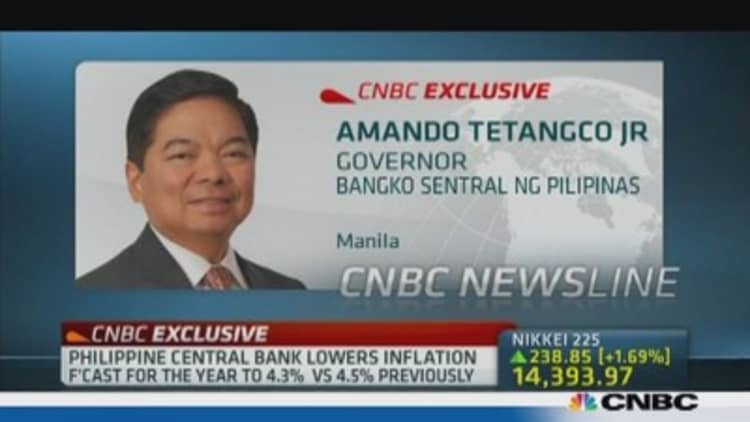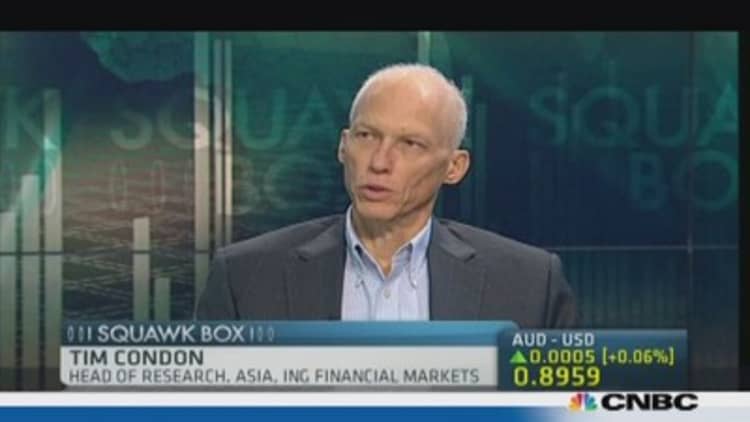
The Philippines has struggled amid the recent emerging market sell-off, but the nation's strong fundamentals should lead investors to single it out again soon, its central bank told CNBC.
Steep selloffs in the Argentine peso, and in January triggered a bout of emerging market weakness which spread like wildfire. No emerging market has been safe; even the Philippines which has long been praised for its strong economic growth and well-managed finances has taken a hit.
Asked when investors would wake up to the fact that the Philippines is different to other, weaker emerging markets, Amando M Tetangco, Jr, Governor of the Philippines central bank - Bangko Sentral ng Pilipinas (BSP) - told CNBC Asia's Squawk Box on Friday this would happen soon.
(Read more: Will US jobs report bring relief to emerging markets?)
"I think that's going to happen pretty soon. Once the uncertainty diminishes further, and the [Federal Reserve] moves towards to the final approaches to these tapering moves, less and less uncertainty will come in. And I think investors will focus on the fundamentals again and come back to countries like the Philippines," said Tetangco.
The Philippine peso has slumped 2.15 percent against the dollar year to date, while stocks have lost around 3 percent since hitting a high of 6,195.64 on January 24 amid recent emerging market turbulence.
Sell-offs in the nation's financial markets have occurred despite good fundamentals, including a healthy current account surplus of 4.1 percent of gross domestic product and expected to rise this year and next.
(Read more: Five reasons to be positive on the Philippines)
Furthermore, it has one of the world's fastest growing economies, logging 7.2 percent in 2013, and proving resilient to the impact of a devastating typhoon, which struck the country in November, incurring $3.1 billion in damages according to Reuters.
However, one worrying headwind for the country's central bankers could be rising inflation, which picked up to 4.2 percent on year in January, from 4.1 percent in December. Electricity price hikes are on the cards, although they have recently been pushed back, while a weaker peso raises import costs and stokes inflationary pressures.
(Read more: Fed volatility is emerging markets' 'poison': Analyst)
On Thursday, the Philippines central bank maintained interest rates at 3.5 percent at its first policy meeting of the year. It was the tenth consecutive meeting rates were held steady, after 100 basis points of cuts in 2012.

The nation's inflation rate is now at the upper end of its target range of between 3.5 to 5 percent. The bank reduced its inflation forecast for this year to 4.3 percent from 4.5 percent, and raised its 2015 forecast to 3.3 percent from 3.2 percent. The peso weakened on the back of the policy statement, but Tetangco said he was not planning any immediate action to shore up losses.
"The room to keep rates steady may be narrowing compared to last year, when we had the same target range but inflation was at 3 percent, now it's above the midpoint so we are watching it carefully. But inflation, although it has picked up marginally, it's still within the target range," Tetangco added.
Analysts at HSBC said although the BSP had room to hold rates for the time being, they expected inflationary pressures to lead to two rate hikes in 2014.
(Read more: Is the emerging market sell off a buying opportunity?)
"While the decision to hold policy rates steady was as expected, the upcoming 27 March meeting will be an important one to watch as it signals when the BSP will begin hiking rates," said Trinh Nguyen, Asian economist at HSBC.
"With many factors fueling inflationary pressures, we expect headline inflation to accelerate significantly in H2 2014... We expect two hikes to take place in H2 2014, taking the reverse repurchase rate to 4.0 percent from 3.5 percent," added Nguyen.
— By CNBC's Katie Holliday: Follow her on Twitter: @hollidaykatie


